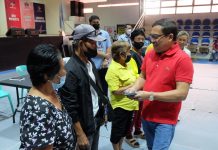One of the developing world’s most inspiring success stories has just gained a new ally. Microfinance, long perceived to be the effective and sustainable tool against poverty, gets a lift with the influx of volunteers from Accenture Philippines.
Microfinance is the practice of granting credit, insurance, savings and other financial services so the poor can start small businesses. Usually provided by microfinance institutions (MFIs), it lessens poverty by boosting income, which in turn provides access to food, health services, housing, and education.
While capital is considered to be the lifeblood of microfinance, every microfinance practitioner knows it requires more than funds to generate an impact in poverty alleviation. Lifting lives from poverty calls for dedication and patience—you have to be selfless in sharing your talents and knowledge.
It is hence inspiring to meet people like Alexander Anden, Jennifer Meily, and Mia Taroy—Accenture Philippines volunteers who are taking time off work to contribute their expertise to make microfinance a more successful tool against poverty.
Accenture is a global company that provides consulting services in business process outsourcing. Accenture has been active in the Philippines since 1985, and now employs about 20,000 staff in the country.
Alex, Jennifer, and Mia are the first batch of Accenture staff who will serve as pro bono consultants to MFIs seeking to automate their existing operations and client information. They are currently providing technical advice to help automate accounting and collection systems and data backup and documentation processes for Bicol MFIs to achieve greater efficiency.
They also served as the resource persons for the management information system (MIS) training. MIS is a general term for the system of organizing and managing information about one’s business operations. The training seeks to provide MFI workers with a perspective on how to apply information technology to this essential aspect of microfinance operation.
Dan Songco, president and CEO of the PinoyME Foundation, a social investment banking entity for MFIs, explained: “The training gives the MFIs a perspective on what it takes to have an automated system. PinoyME has conducted trainings like this before, but without the consultant we were not able to track its effect on the operations of the MFIs.”
“This is a unique intervention because no one else is doing this. We’ve had a lot of discoveries in our past training workshops, and one of them is how important the MIS is to both the MFI and the client. If you have a weak system, you would not know if your MFI is already suffering losses. That’s critical and what’s even more critical is computerizing that system. We’ve heard a lot of horror stories of MFIs hiring consultants to design software only to find out that it does not compliment their operations.
“The course helps them understand, ‘If you want to automate this is how to do it’. If we are able to help MFIs systematize their MIS, then we can really make the industry more efficient and we can make it grow faster and reach more poor people. The big MFIs can already afford to buy software and hire consultants. But there are only a few of those. The program targets the medium-sized MFIs who would not have the resources for automation. This is a strategic partnership with Accenture. We convinced Accenture that they can really make a difference in the microfinance industry if they partner with us in this program.”
Rising to the challenge
Alex, Jennifer, and Mia revealed they became part of the project after volunteering to Accenture’s Skills to Succeed Program. According to them, the program is meant to “enhance the skills of the employees, and is also a way of sharing their experience, knowledge, and skill with others.”
Aside from providing technical support, Accenture also donated one million pesos to the PinoyME Foundation for the implementation of a microenterprise financing program for the spouses or selected beneficiaries of Accenture’s security guards and custodians. Accenture’s 20,000 employees raised P200,000 while the Accenture Foundation provided P800,000 for the program.
The volunteers said the project was “challenging, but at the same time also very rewarding,”
“This is the first time for us to do consultations as our work in Accenture mostly involves testing, programming design, and production support. This is also the first time for us to handle local clients.”
Jennifer added: “We see giving the MFIs the groundwork for automation and solution planning as challenges. So we are not doing this only for the aim of the company, but also for personal development. By providing these free consultations, we are enhancing not only our skills in testing and programming, but also in dealing with people.”
“Moreover you tend to help people,” Jennifer said: “During the immersion when we met microentrepreneurs visiting the offices, we saw that if we help microfinance practitioners, in a way we are also helping struggling Filipinos improve their lives.”






